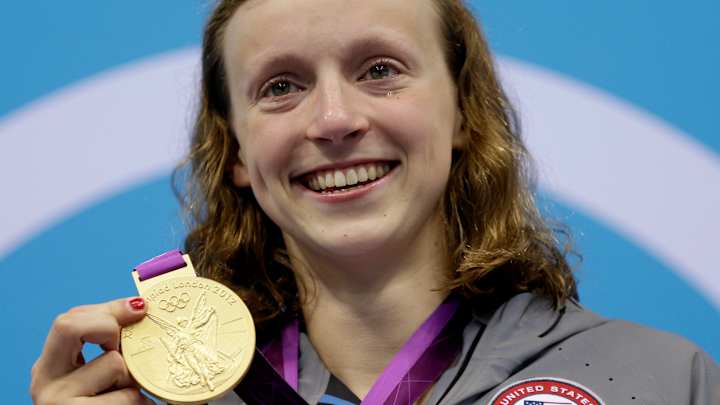Ledecky won't get shot at Olympic gold in 1 of best events

Katie Ledecky figures to capture plenty of gold in Rio.
She won't be winning one of her best events, however.
She won't even get a chance to swim it.
Ledecky has been the world record holder in the 1,500-meter freestyle for almost three years, but the metric mile has never been part of the Olympic program for women.
The longest event the 19-year-old can tackle at the Summer Games is the 800 free.
''It's not something where I'm disappointed,'' Ledecky said recently. ''Tell me what events are there, and I'll work toward those events. This year, the 800 is the longest thing I have to work toward.''
That's quite a shame, especially for the fans in Rio de Janeiro, Italian coach Stefano Morini said.
''They'll miss a great performance, almost surely another world record, and probably a swim that would have put her even closer to the times of the elite men,'' he said.
Janet Evans, long regarded as the greatest female distance swimmer, held the 1,500 world record for almost two decades, until it was taken down by Kate Ziegler in 2007. That mark stood until Ledecky went even faster at the 2013 world championships in Barcelona, Spain.
Since then, Ledecky has eclipsed her own 1,500 record four more times, most recently with a time of 15 minutes, 25.48 seconds at last year's worlds in Kazan, Russia, where she broke the mark she set in the preliminaries by more than 2 seconds and romped to victory in the final by nearly 27 seconds over runner-up Lotte Friis.
FINA, the sport's governing body, has pushed to add the women's 1,500 to the Olympic program (along with the 800 free for men), which would match the program at the biennial world championships. The International Olympic Committee has rejected those proposals, not wanting to add more events to an already crowded schedule.
With the list of races already set for Rio, the next chance to make a change will be at Tokyo in 2020.
''We believe the world championship program is excellent,'' said Cornel Marculescu, executive director of FINA. ''We believe it's also good for Olympics. But there are other criteria. Hopefully for Tokyo they'll consider our requests differently.''
Morini, who coaches Italian distance swimmers Gregorio Paltrinieri and Gabriele Detti, said the Olympic races are a holdover from a long-disproved belief that women weren't capable of swimming a grueling event such as the 1,500.
''Obviously, that's ridiculous,'' said American Connor Jaeger, who took silver in the men's 1,500 at last year's world championships.
Even more so when considering that men and women have both competed in a 10-kilometer open water event since the 2008 Beijing Games.
''I find it strange that the only races at the Olympics where men and women don't compete at the same distance are the 800 and the 1,500,'' Morini said. ''It's a bit antiquated.''
Women didn't even compete in swimming at the first four Olympics, joining the program with two events at the 1912 Stockholm Games. There remained a disparity between the number of events for men and women until the 1996 Atlanta Games, when swimming equality was finally achieved with 16 events for both men and women - a pool program that has remained in place ever since.
But men and women have never competed in the same swimming events at the Olympics. While the men's 1,500 free has been around since 1908, the longest individual event for females was 400 meters until the 1968 Mexico City Games. That's when the 800 free was added, and it remains their longest pool event at the Olympics.
The world championships, on the other hand, have grown to include the same events for both men and women, including 50-meter races in all four of the strokes (as opposed to the Olympics, which have only the 50 free).
Ledecky's coach, Bruce Gemmell, believes there is a better chance of the IOC approving 50-meter events for the backstroke, breaststroke and butterfly than adding the women's 1,500 free.
''Everybody wants immediate gratification - short, quick races,'' he said.
The 1,500, on the other hand, is a long, tedious race that can look a bit boring to the casual fan - especially when a dominant swimmer such as Ledecky is lapping the field.
Not necessarily what the IOC is looking for in its quest to appeal to a younger, hipper crowd.
''They want to put it on TV, and they want to have 40 people that are in theory competitive to win,'' Gemmell said. ''If you put a 1,500 out there now, or even an 800 for the men, how many people are really competitive to win it? Not very many. I think the 50s are a stroke where at least somebody, even if lose, they can say, `Oh, I was only three-10ths (of a second) off.' That's a lot in the 50, but it doesn't sound like it.''
Ledecky wouldn't want to add the 1,500 free if it meant dropping the 800, an event she won at the 2012 Olympics and was one of Evans' signature races.
''There's such a strong history in it,'' Ledecky said. ''I don't think the 800 should ever be eliminated from the Olympics.''
Even without the 1,500 free, she'll be busy enough in Rio. Ledecky is an overwhelming favorite to win the 400 and 800 free (she also holds the world record in those two races) and looks to be one of the top contenders in the 200 free as well. Throw in a couple of relays and she's got the potential to take as many five gold medals.
''I don't think it would add anything this year if she was swimming a 1,500,'' Gemmell said. ''Just another race.''
---
AP Sports Writers Andrew Dampf in Rome and Noah Trister in Detroit contributed to this report.
---
Follow Paul Newberry on Twitter at www.twitter.com/pnewberry1963 . His work can be found at http://bigstory.ap.org/content/paul-newberry .
